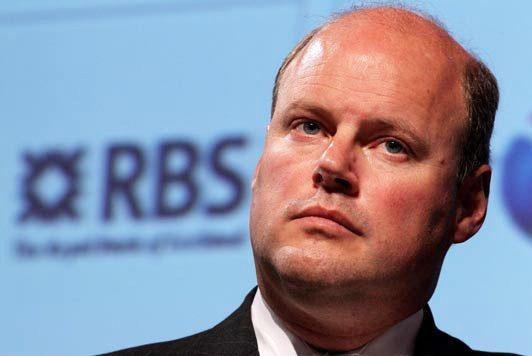RBS Holds Secret Talks to Find Stephen Hester Replacement, Say Insiders

The future of Royal Bank of Scotland chief executive Stephen Hester could be in doubt after insiders revealed the bank's directors have held secret talks aimed at finding a successor.
The bank is 82% owned by the British taxpayer after it received a £45bn bailout during the financial crisis of 2008.
RBS chairman Sir Philip Hampton summoned a meeting of the bank's non-executive directors earlier this month, telling them he was drawing up a list of prospective replacements.
The list includes Richard Meddings, the finance director of Standard Chartered, according to sources close to the talks. It is not known whether any candidates have yet been approached.
"Both the chairman and chief executive have been on board for nearly five years," said one source. "It is natural that they are beginning to think about the longer term."
The timetable for possible changes at the helm of RBS has not been disclosed, though its board is said to "think it prudent" to examine who should be in charge ahead of what is expected to be a lengthy process of returning the state-backed lender to private ownership, the sources said.
Board members are said to have voiced alarm when Sir Philip suggested he had been "asked to prepare a shortlist", according to Sky News.
The search for potential successors is taking place with the involvement of UK Financial Investments, the Treasury agency which manages the taxpayer's stake in RBS and Lloyds Banking Group, say insiders.
It is believed George Osborne, the Chancellor, whose relations with Hester have been strained, will have some role in the decision. The two men have clashed in the past over RBS's strategy.
Last year, under heavy political pressure, Hester turned down his controversial £1m bonus. Hampton said in February that a decision about Hester's bonus for 2013 would be made at the end of the year.
There is no suggestion that either Osborne or Treasury officials initiated any process to replace the RBS chief executive. The Chancellor is understood to have "recused" himself from any discussions about Hester's future.
Any plans to replace Hester would be hugely sensitive, with a change at the top having the potential to destabilise Government efforts to secure the bank's reprivatisation.
RBS will be ready to enter the process of being sold back to private sector investors by the middle of next year, Hampton has said.
Any pressure by UKFI or other shareholders to push Hester out would rattle the City, with the RBS chief executive widely thought to have done a capable job.
Hester has overseen a vast shrinking of the bank's balance sheet since he joined RBS from the property company British Land.
He has previously suggested he is committed to staying on at RBS for "years to come", telling colleagues at a conference in March that he would remain in place at least for the initial stages of re-privatisation.
RBS's share price remains well below what would be regarded as break-even for the rescue package put together in 2008, led by Gordon Brown and Alastair Darling.
Analysts speculate that the Government will seek to sell the taxpayer's stake in the bank at least partly through a mass retail offering, much in the way British gas was sold off in 1986, when the government ran a TV ad campaign under the slogan 'Tell Sid'.
Hester has been careful not to express a view about the method by which the bank is sold back into the private sector, in view of the political sensitivities.
RBS has declined to discuss the reports, and UKFI was unavailable for comment on the rumoured changes.
© Copyright IBTimes 2025. All rights reserved.





















